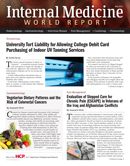Publication
Article
Internal Medicine World Report
Challenges in Hepatitis C Virus Screening
Author(s):
Hepatitis C virus screening is a challenge, and strategies must be implemented to make diagnoses and treatment therapies easier, according to a JAMA study.

Comprehensive screening strategies for hepatitis C virus (HCV) should be implemented, according to a clinical guidelines synopsis published in JAMA.
Researchers from the University of Chicago Medical Center first noted that HCV had become a major problem in the United States, citing its links to cirrhosis, hepatocellular cancer, liver transplantation, and death. But even since HCV screening was implemented in 1992, physicians have been struggling with good, solid screenings. Behavioral risk histories are often incomplete, mild or non-specific symptoms, and persistently normal serum transaminase values all contribute to these difficulties in screening.
The US Preventative Services Task Force (USPSTF), which is composed of primary care physicians and experts in medical health and behavior, developed screening guidelines as a systematic review sponsored by the Agency for Healthcare Research and Quality (AHRQ). AHRQ previously commissioned two reviews to focus on screenings and treatment to update the prior 2004 guidelines. A total of 182 studies were found but found lacking evidence of clinical benefit when screenings were performed in the general US adult population. When studies focused on populations with multiple risk factors, the screenings were much more effective.
The USPSTF review found that several screening tests were found to have good to very good diagnostic accuracy. Another retrospective study determined no difference in sustained viral response rates between patients who did not have a biopsy prior to treatment and patients who did have a biopsy prior to treatment. Thus, the USPSTF concluded that non invasive screening tests were accurate and increasing in availability of effective HCV treatments, especially in high risk populations and patients both between 1945 and 1965.
The review seemed to present little evidence on the harms of the screenings, but some potential negative effects were anxiety, patient labeling, and feelings of stigmatization. There were harms found with liver biopsy such as bleeding, infection, and pain, though using biopsy to make treatment decisions had been proven to accurately diagnose fibrosis and cirrhosis.
Other harms such as fatigue, headache, flulike symptoms, hematologic conditions, and rash, were found to be related to traditional interferon based antiviral therapy. However, these only appeared to last between 4 and 48 weeks, depending on virologic response and genotype.
“In 2011, the US Department of Health and Human Services announced an explicit goal of increasing awareness of infection in those living with HCV,” the authors concluded, while noting that more research was necessary to determine the best screening methods linked to effective therapies. “To achieve this goal, comprehensive screening strategies need to be implemented, a challenge because clinician knowledge of disease prevalence, natural history, and follow up testing procedures is low, with a 2012 study reporting that only 59 percent of physicians regularly screen for patient risk factors, and only half of patients found to have HCV are referred to a subspecialist for further care.”






